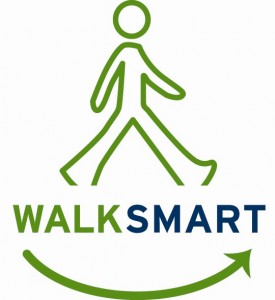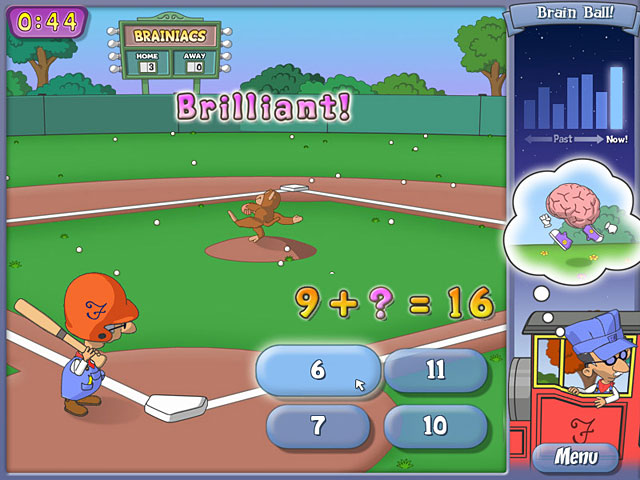Simple Study Skills That Light Up Your Brain!
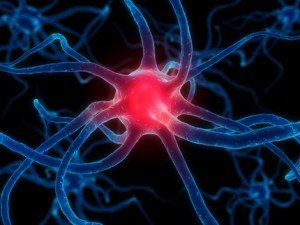 A colleague shared an interesting New York Times article, Forget What You Know about Good Study Habits. The core idea:
A colleague shared an interesting New York Times article, Forget What You Know about Good Study Habits. The core idea:
“In recent years, cognitive scientists have shown that a few simple techniques can reliably improve what matters most: how much a student learns from studying. The findings can help anyone, from a fourth grader doing long division to a retiree taking on a new language. But they directly contradict much of the common wisdom about good study habits, and they have not caught on.”
The few simple techniques uncovered by cognitive scientist for improving how we study include:
1. Regularly change or alternate the room or environment you study in.
2. Study or work related but not identical topics or study tasks in one sitting. For example, when learning a language study vocabulary, written translation and speaking all in the same session.
3. Space study sessions out over time rather than cramming. Alternate study with simple physical activities.
4. Prepare and take mock tests yourself before taking actual tests.
Simple yes but not commonly practiced by students or adult learners engaged in systematic study. Yet they are proven to “light up the brain” or improve our learning performance.
Interested to hear from readers about other study techniques they have found effective.
Categories: Child, College Student, Memory and Learning, Older Adult, Training Tags: study skills
Short Walks Weekly Improve Intelligence
40 Minute Walks 3 Times Per Week at Your Own Pace Measurably Boost Brain Function.
In response to an early post a reader sent me a link to this article – A gentle Stroll can Boost Intelligence. It reports on a study conducted with 100 sedentary adults (self-confessed couch potatoes) that started to walk regularly at their own pace 3 times a week for six months. To make the study interesting the researchers had part of the group do the walking and others do stretching and toning exercises. Here is what they found:
“The walkers also had increased connectivity in the part of the brain which helps in the performance of complex tasks and they did significantly better on cognitive tests than their toning and stretching peers.”
This means mild aerobic exercise can change the wiring of your brain and improve cognitive performance. The effect was especially pronounced in the older adults in the study.
Categories: Lifestyle, Older Adult, Problem Solving Tags: exercise
Cognitive Advancement NOT Decline with Age
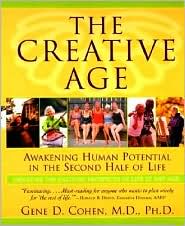 The theme behind this blog is that nature gave us the hind brain, mid brain and fore brain, now the Next Brain is up to us. A somewhat playful way of making the claim that we now have enough science, technology and practical insight to implement training programs and lifestyle changes that will significantly impact brain function and cognitive performance. The 80+ posts on this site are just scratching the surface.
The theme behind this blog is that nature gave us the hind brain, mid brain and fore brain, now the Next Brain is up to us. A somewhat playful way of making the claim that we now have enough science, technology and practical insight to implement training programs and lifestyle changes that will significantly impact brain function and cognitive performance. The 80+ posts on this site are just scratching the surface.
One of the most exciting trends that support the prospects of your Next Brain is the recent scientific work suggesting many important cognitive functions actually improve with age. Indeed, there maybe several stages of cognitive development that move us through adulthood and old age. I have blogged on this before but want to encourage you to read Cohen’s book, The Creative Age. It is inspirational at many levels but one of the things that is particularly striking are the examples he gives of major creative contributions made by older adults.
Some examples:
- Freud publishes the Ego and the Id (his major work) at 67
- Stradivaria (or Stradivarious) designed and built his two most famous violins – the Habeneck and the Muntz when he was 92
- Leaky made her most important archeological discovery (hominid footprints that are 3.5 million years old) when she was 65
- Alexanderson was award a patent on the color television reciever developed for RCA when he was 77
- A 65 year old physicist was the first to liquify helium in 1932
- Michelangelo was 72 when he was appointed architect for St. Peters in Rome
These examples are important because they demonstrate creative acts of global importance started and completed by older adults. This is very different from the many examples of older adults that are recognized for creative acts completed during younger years.
Now most of us are not world-class scientists, artisians, inventors or leaders but the message from these examples is still very relevant:
It is possible to continue to develop and use advanced cognitive skills as we age into our 60s, 70s, 80s and even 90s.
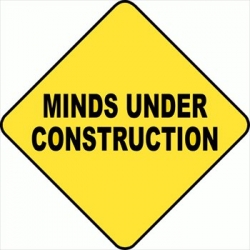 This challenges one of the major myths about the aging brain that shrinks, becomes forgetful, cannot grow new brain cells/connections, loses energy and in more and more cases slides into dementia. Clearly our minds are still under construction.
This challenges one of the major myths about the aging brain that shrinks, becomes forgetful, cannot grow new brain cells/connections, loses energy and in more and more cases slides into dementia. Clearly our minds are still under construction.
Perhaps we will ultimately learn that the decades of later adulthood and old age are in fact just the time and proving grounds we need to build our Next Brains.
Categories: Cognitive Decline, Older Adult Tags: creativity
Focused Training Produces Extreme Mental Feats Even in Older Adults
The Next Brain Blog is dedicated to exploring the techniques, materials and lifestyle choices that lead to improved brain function and peak cognitive performance. Much of what you will find on this blog produces incremental effects. The idea is to combine many of them into a program and reap the rewards over the longer term. That is the way it works with physical exercise and indeed with most things in life. But this need not be as boring as it sounds.
A longterm tightly-focused cognitive training program can produce extreme and even profound results in ordinary people.
Take for example, the case recently reported in the Research Blog about a 58 year old man, JB, that was able to memorize and recite (under controlled conditions) the entirety of Milton’s Paradise Lost. That is a 10,565 line 60,000 word epic poem. It took him nine years.
“Just how did JB manage to pull off this incredible feat? He studied for about one hour per day, reciting verses in seven-line chunks, consistent with Miller’s magic number seven – the capacity of short-term, working memory. Added together, JB estimates that he devoted between 3000 to 4000 hours to learning the poem. Seamon’s team interpret this commitment in terms of Ericsson’s ‘deliberate practice theory’, in which thousands of hours of perfectionist, self-critical practice are required to achieve true expertise.”
And his performance was far find mindless memorization. It involved “deep cognitive involvement” with the material.
One hour a day for nine years. A lot of training but doable. You may not be interested in memorizing a book but that’s not the point. JB’s work demonstrates that we can achieve extreme mental performance if we are willing to put in the work. A general claim is that with the right training you can achieve world-class performance in 10 years or 10,000 hours in any domain. It is not talent that wins but dedication, proper training and time. Looks like this might hold for cognitive performances as well.
Very interested to hear from readers that are considering or engaged in a longterm tightly-focused cognitive training program.
Categories: Memory and Learning, Older Adult, Training Tags:
The Amazing Brain Train
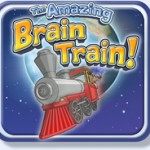 A playful way to do a little brain training using games: “Fueled by your mental energy, Professor Fizzwizzle’s Brain Train will take you on a brain-boosting adventure!
A playful way to do a little brain training using games: “Fueled by your mental energy, Professor Fizzwizzle’s Brain Train will take you on a brain-boosting adventure!
Put your mighty mind to the test and see how far you can go!”
15 online games for training your brain in planning, memory, spatial reasoning and numbers all for $6.99 or free for 24-hours. For a quick look check out this video.
Categories: Child, Memory and Learning, Mental Focus, Perception, Software Tags: games
Mental Fitness Cards that Really Work
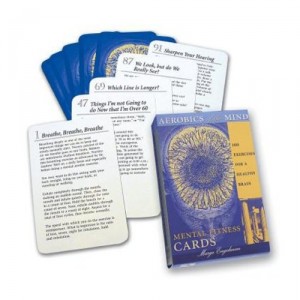 Couple of years ago I bought a pack of Mental Fitness Cards and started to experiment with them. You get 100 cards that provide very specific activities designed to maintain or even enhance the senses, memory, problem solving, linguistic abilities and numeracy. The cards come in a nice sturdy box and include a booklet that provides an overview and suggestions for how to use the cards.
Couple of years ago I bought a pack of Mental Fitness Cards and started to experiment with them. You get 100 cards that provide very specific activities designed to maintain or even enhance the senses, memory, problem solving, linguistic abilities and numeracy. The cards come in a nice sturdy box and include a booklet that provides an overview and suggestions for how to use the cards.
The cards are geared for seniors but I have found 12 that appear to be very useful in general.
One of my favorites is #91 Sharpen Your Hearing. The activity involves turning the volume down on your TV or talk radio show until you can hear but no longer make out what is being said. You then slowly turn it up until you can just barely but clearly hear what is being said. When you repeat this you should not have to turn it up as much to get words because you are learning to focus your hearing. The card talks about drawing lines a on sheet of paper to measure progress. I did not track with that but do it in the car where my radio gives me a number for the volume setting. This way I can measure progress exactly. I am not recommending that you do this in the car.
I am interested to hear from readers about other card-based mental fitness products and how they are using them.
Categories: Books, Cognitive Decline, Memory and Learning, Older Adult, Perception Tags:
Preventing Cognitive Decline – No Science Yet!
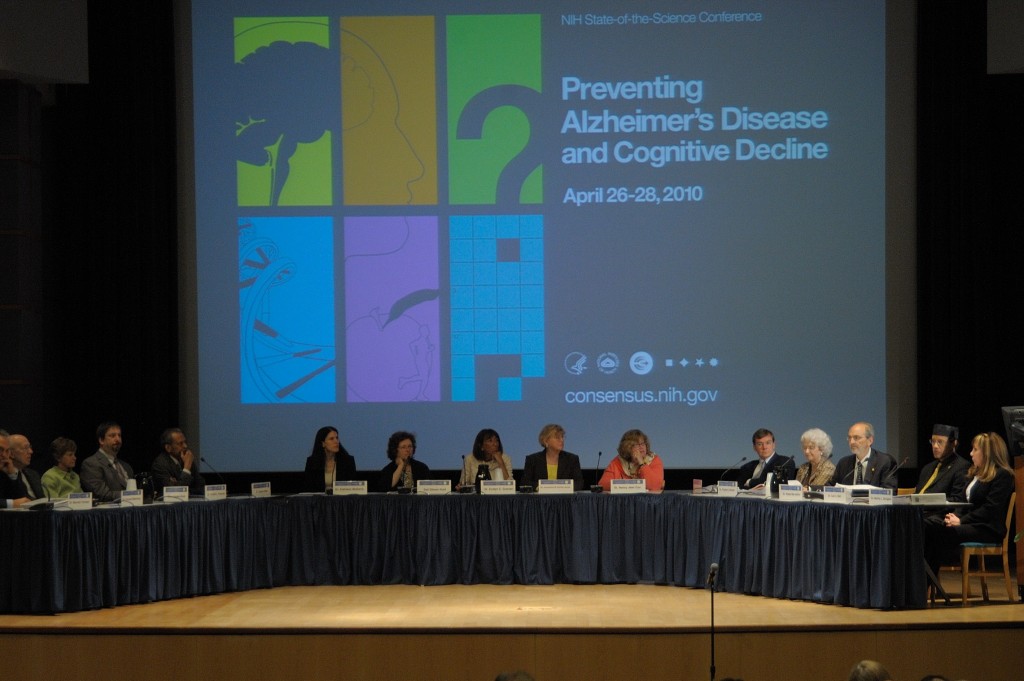 The state of the science conference sponsored by the National Institute of Heath on Preventing Alzheimer’s and Cognitive Decline is over. You can read an excellent recap in the LA Times or read a draft of the conference statement. For readers of the Next Brain Blog, a key finding is:
The state of the science conference sponsored by the National Institute of Heath on Preventing Alzheimer’s and Cognitive Decline is over. You can read an excellent recap in the LA Times or read a draft of the conference statement. For readers of the Next Brain Blog, a key finding is:
we have not done enough scientific research (large scale population based studies) to know what really works.
But the committee goes on to say:
“Some preliminary research suggests that a few prevention strategies could emerge as helpful, according to the report. These include programs that train people in memory, reasoning and speed of thinking as well as omega-3 fatty acid supplementation, physical activity and a diet low in saturated fat and high in fruits and vegetables.”
We have covered and will continue to cover all of these techniques.
Categories: Cognitive Decline, Older Adult Tags:
Does Raising a Child Make You Smarter?
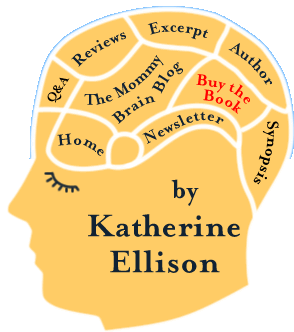 Absolutely, if you are the Mother! At least that is the argument made Katherine Ellison in her book the Mommy Brain: How Motherhood Makes Us Smarter.
Absolutely, if you are the Mother! At least that is the argument made Katherine Ellison in her book the Mommy Brain: How Motherhood Makes Us Smarter.
Motherhood gives a brain boost in many ways including face reading, multi-tasking, fearlessness, serenity, empathy, assertiveness and mental dexterity. These improvements in both IQ and EQ come from a combination of new hormones, motivation and practice that motherhood brings about.
The book is well founded in the latest neuroscience. It upends the stereotype of mothers checking their brains at the delivery room doors. Check out the Mommy Brain site by clicking on the graphic to the right.
Categories: Books, IQ and EQ, Lifestyle, Manage Emotions, Mental Focus, Parent, Perception Tags: embodied cognition, EQ
3-Hour Brain Boot Camp at UCLA
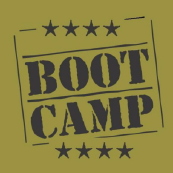 The Center for Memory and Aging at UCLA offers a half-day intensive course that covers (and I quote):
The Center for Memory and Aging at UCLA offers a half-day intensive course that covers (and I quote):
- Measure baseline memory, stress and fitness levels to individualize healthy lifestyle programs.
- Learn basic techniques to respond to everyday memory challenges..
- Sample a healthy brain diet and learn recipes for a brain-protective nutritional plan.
- Master advanced memory techniques for names and faces.
- Practice relaxation exercises to improve mental focus.
- Map out a daily lifestyle plan for maintaining benefits for the long haul.
- Gauge progress and notice results in just one day.
The course is geared towards older adults with memory concerns. It was developed by Gary Small and other experts in memory, aging and the brain.
Interested to hear from readers that have completed this course or similar courses that take a scientific approach to age-related memory challenges.
Categories: Cognitive Decline, Memory and Learning, Older Adult, Training Tags:
Fish Oil Fails to Boost Cognition in Older Adults
 Another major scientific study on a technique for improving brain function and cognitive performance has delivered a negative result. The study looked at the cognitive impact of taking Omega 3 fatty acid or fish oil over a two year period on 70-80 year olds. The study found:
Another major scientific study on a technique for improving brain function and cognitive performance has delivered a negative result. The study looked at the cognitive impact of taking Omega 3 fatty acid or fish oil over a two year period on 70-80 year olds. The study found:
No cognitive improvements as compare to a placebo.
The author of the study cautions drawing strong conclusions as it may take more than two years to see an effect or it might be essential to start earlier in life. To quote:
“From the data we have collected in the OPAL study there is no evidence of an important benefit for memory or concentration of increased omega-3 fatty acid consumption over a two year period among older people with good cognitive health. However, it is important to keep in mind that poor cognitive function can take many years to develop and although this is the longest trial of its kind ever conducted, it may be that it was not long enough for any true beneficial effects to be detected among this healthy cohort of older people”.
OPAL stands for Older People And omega-3 Long-chain polyunsaturated fatty acids. The OPAL study seeks to discover simple dietary supplements that will help maintain cognitive and retinal function later in life. We will continue to track their work and report results on the Next Brain Blog.
Categories: Cognitive Decline, Diet, Memory and Learning, Older Adult Tags:

